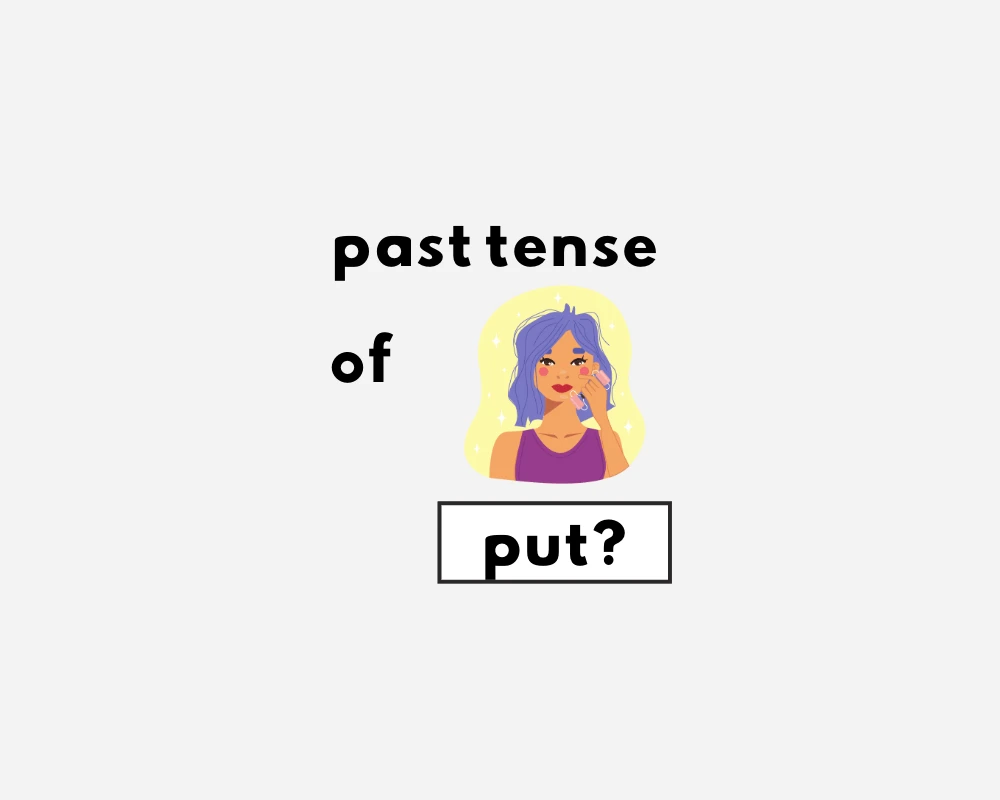
Contents
Toggle
Putted or put? What’s the past tense of “put”?
The question, ‘what is the correct past tense of put’ seems simple, but remember that irregular verbs come in various forms. Some are identical to their present tense forms.
This happens to be the case with the past tense of put, which is simply put. Like a few other irregular verbs with also one form in the past and simple present, like hurt, shut, bet and set.
Verb forms of put
Let’s define the subject topic first. Collins Dictionary defines it as, “when you put something in a particular place or position, you move it into that place or position: ‘I’d put the children to bed already”.
The sentence “I’d put the children to bed” includes the contraction I + had (I’d); which is the past perfect tense formation; i.e., had with the past participle form of the verb. In other words, should you see ‘put’ used with have or had, then this indicates the present perfect in the former and past perfect in the latter.
| present | past | future | |
| simple | I put | I put | I will put |
| continuous | I am putting | I was putting | I will be putting |
| perfect | I have put | I had put | I will have put |
| perfect continuous | I have been putting | I had been putting | I will have been putting |
Verbs with one present and past tense
| base verb | past tense | past participle |
| put | put | put |
| burst | burst | burst |
| bet | bet | bet |
| shut | shut | sunk |
| hit | hit | hit |
| set | set | set |
Examples of the verb put in sentences (present tense)
1. I always put my books on the table when I get home from school.
2. Will you please put the book back on the bookshelf?
3. Please put the car in the garage once you get home.
4. The paper is put onto the porch by the paperboy.
5. This is going to put them out of business.
Examples of put in sentences (past simple)
1. Maria bent the straw and put it in the can of soda.
2. He put his arms around her and held her tight.
3. He fell and accidentally put his hand through a window.
4. She put her house up for sale.
5. They put us up last weekend.
Examples sentences of put as a participle
1. Jake had been put up by his friends before he moved in with us.
2. She had put on some weight before moving to New York City.
3. We had been put off by the sights in the city, as they were unseemly.
4. We’d like to put our things away before heading out.
5. He had crossed out ‘Screenplay’ and put ‘Written by’ instead.
Synonyms of put
- place
- set
- leave
- stick
- position
- lay
- settle
Practice questions: forms of “put”
| Questions | Answer options: |
|---|---|
| 1. True or false: “To put” is a regular verb. | a. true b. false c. both |
| 2. True or false: “Put” looks the same in the present and past tense. | a. true b. false |
| Choose the correct verb form to complete each sentence: 3. He ___ his clothes on before breakfast. | a. puts b. put c. putting |
| 4. She had ___ the flowers in a vase. | a. puts b. put c. putting |
| 5. She is ___ her house up for sale. | a. putted b. put c. putting |
| 6. I ___ the keys on the table. | a. putting b. puts c. put |
Answers
- b
- a
- a
- b
- c
- c
Origin of the verb put
From etymology online on put (v.):
Middle English putten, from late Old English *putian, “to thrust, push, shove” (someone or something; a sense now obsolete), also “to move or a thing physically so as to place it in some situation”.
Other commonly confused verb tenses
- What’s the past tense of spread?
- What’s the past tense of lead?
- What’s the past tense of choose?
- What’s the past tense of fly?
- What’s the past tense of lay?
- What’s the past tense of drive?
- What’s the past tense of draw?
Learn more about verbs
- What are regular and irregular verbs?
- Transitive and intransitive verbs?
- What are verbs?
- What’re personal pronouns?
- What’s the difference between they’re, their, and there?
- Whose vs who’s?
Sources
- Most material © 2005, 1997, 1991 by Penguin Random House LLC. Modified entries © 2019 by Penguin Random House LLC and HarperCollins Publishers Ltd
- Harper, Douglas. “Etymology of put.” Online Etymology Dictionary, https://www.etymonline.com/word/put. Accessed 21 February, 2023.










